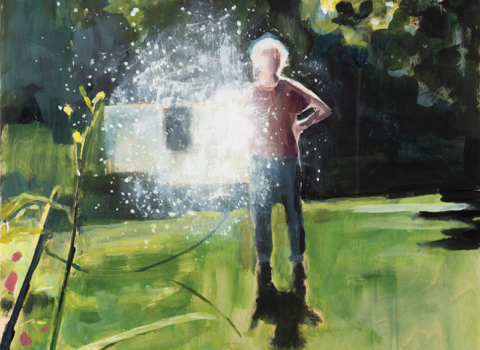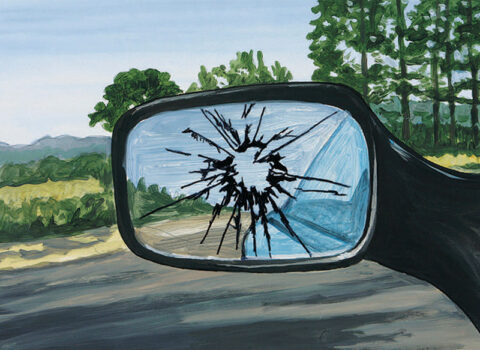From Night. Sleep. Death. The Stars., which will be published this month by Ecco. The novel tells the story of John Earle “Whitey” McClaren, a sixty-seven-year-old businessman who is beaten and tasered into unconsciousness by two police officers after trying to prevent them from assaulting another man during a traffic stop. McClaren is taken to a hospital and put on a respirator, where he tries to piece together what happened.
Hey! Let me explain.
But it isn’t clear: What can Whitey explain?
Problem is this burning sensation in his throat. No voice. Eyesight all blotched. Like someone has rubbed ashes into his eyes. And—breathing? Was he breathing? Something is breathing for him. Like force-feeding. Pumping air into his lungs in an ugly chuffing like a bellows.
What happened was . . .
. . . struck by lightning.
Confused memory of his vehicle bouncing, jolting along the shoulder of the highway. Potholes, the kind you don’t see until it’s too late, goddamn you can ruin a tire that way but you won’t know it immediately, the air will hiss out slowly and one day (soon) the (not cheap!) tire will be flat.
Trying hard to remember why he’d stopped. Leaving the highway at a high speed (?). Trying to remember what happened next.
Trying so hard, the effort is hurting his brain.
(But why assume that something actually happened? Maybe this condition he’s in is just—him.)
(Always liked to take the contrary position, if there was one. Even as a kid. Schoolteachers, smiling and shaking their heads at Johnny McClaren—long ago as grade school. Flattering to Whitey all his life to be told he sounds like a lawyer. Except he isn’t a lawyer.)
Last memory has to be a face: glimpsed at a distance, as in a telescope in reverse.
Dark-skinned face. Dusky-skinned.
Stranger’s face. He thinks.
(Or were there more than one of them? Faces.)
Face recognition at birth. He’d read. Infant’s neurons fire at the sight of a human face. Because survival can depend upon recognizing a human face. Does depend. Is that true at the end—also?
End? Of what?
Can remember, must’ve been junior high, reading Scientific American. “Steady-state universe.”
Well, that was comforting. Never had to wonder what had come before the universe, or what would come after. Universe just was.
Made more sense than that God had “created” the universe in a few days like a stage magician pulling things out of hats. Even as a kid he’d never taken that seriously.
But then, the Big Bang was—(how’d you phrase it?)—discovered.
So the universe isn’t “steady”—isn’t a “state”—but erupted out of nothingness at a point before time began and is still exploding outward billions of years later. Are its components rushing away from the center, and from one another, forever and ever?—Or just for a fixed time?
Not a theory. He thinks. Proven fact: Hubble Telescope.
Jessalyn laughed and pressed her hands over her ears. Oh, Whitey! It makes me dizzy to think about that.
Think about—what?
Eternity.
This was a surprise to Whitey. Hadn’t expected to hear his young wife utter such a word, and the expression on her face suddenly serious—pained.
Hadn’t known that’s what they’d been talking about—eternity.
In fact he’d just been talking. Something out of the newspaper. Like Whitey McClaren, every crazy thing sifts through his brain and awakens some spark there.
It was like her, though. The young wife. Say something to her, any random remark, off the top of his head, in Jessalyn it acquired meaning, gravity.
Other girls he’d joked with. Liked to laugh.
But with Jessalyn Sewell, you didn’t. Not much.
Hearing himself say, What the hell, maybe we should get married, and another girl might’ve laughed, knowing it was, or maybe was not, not-serious, but Jessalyn lifted her beautiful eyes to his—Yes. All right.
That look, piercing him to the heart. He’d felt it—actually, not a mere figure of speech—beneath his breastbone. Tough muscle-heart, pierced with certainty.
For he’d known (hadn’t he?) from the start. Only one person like Jessalyn Sewell in his life who could make John Earle McClaren a better human being, not (merely) accept him as he was, who could love him for what he might be, his deepest self. In this individual was the gravity required to keep Whitey McClaren’s helium-soul from drifting up into the clouds, and being lost.
Funny he’s having such difficulty talking now; he who’d always been an easy talker. Never shy even as a kid. Oh Whitey! He can converse with anyone. Strike up a conversation anywhere. Any stranger.
But that had not happened, had it. Feeling the chagrin, the hurt of an obscure rebuff.
Kick in the stomach, groin. That kind of rebuff.
Whoever it had been, they hadn’t liked him. Hadn’t been charmed by him. Problem is, he’s old.
Problem is, he’s cold.
Teeth chattering. Feels like bones chattering. That chit-chit-chittering noise the long-billed, long-legged herons made, sends a shiver up the spine.
Problem is, some careless person (attendant?) has left a window open here.
Wherever here is.
Rushing wind. Rain splatter flung like tears.
From where he’s lying, where the bastards have pinioned him, and with this goddamn respirator down his throat, can’t move to reach the damned window to shut it.
He has glimpsed her—his wife. The young wife, face lit from within.
His dear wife. Has he forgotten her name?
Wife—the word is a burr in his throat.
Can’t speak. Words like thorns. Trying to cough up the thorns, to clear his throat to speak.
Has forgotten—speak.
Reaches for her hand—but he is being pulled from her.
Darling?—I love—
The wind is rushing, can’t hear.
It is so tempting to give up! So tempting, so tired. His legs heavy . . .
Not like Whitey McClaren, to give up. Goddamn he will not.
Never a good swimmer, his legs are too heavy. But he is swimming now. Trying.
Wind-buffeted waves. Very hard to swim against. Swift current. Cold.
Barely, keep afloat. Just—his head—uplifted, at tremendous strain. One breath at a time.
Swimming wasn’t his sport. Hadn’t the right body shape to cut through the water. Too inward. Throwing you back on your own thoughts, not good.
Football was his sport. Running, careening together, tangling legs, headbutts, piling on . . . Tackling: that word, he’d loved.
Loved the sweat smell, his own and the other guys’. And the dirt smell.
Swimmers stink of chlorine, too clean. Up your nostrils. Christ!
Touch another guy in the pool, brush legs, what the hell . . . Repulsive like lizard skin.
Harsh clean chemical smell in this damned place: antiseptic.
Germ-free. Bacteria-free.
What did his scientist daughter say: Life is bacteria, Daddy.
The kids, how’d they grow up so fast? Turned his back, there was Thom moved out of town. Beverly, pregnant. Slap in the face but no, not right to think that way.
You know better, Whitey. Please.
You can’t possibly be jealous of your own son-in-law.
And now grandchildren. Too many! Names slipping from him like water through outspread fingers.
Christ, life is a struggle. Anybody who tells you anything else is a liar.
The greatest effort—breathe . . .
Pushing, shoving. Trying to get free, to breathe. Shouts of strangers in his face, booted feet kicking. Two of them.
Had that been real? Had it?
Electrocuted. He’d stepped, or fallen, onto a wire cracking electricity . . .
His face. Throat. Afire.
Is he—dead?
Not possible. Ridiculous.
But in this rough-rippling current, a dark wind. Frantic exertion of arms, legs. His strong shoulders, or shoulders that had once been strong only days ago. Arms like frantic blades propelling him upward.
Can’t give up. Can’t drown. Love you so.
Oh God, love you all.

























































































